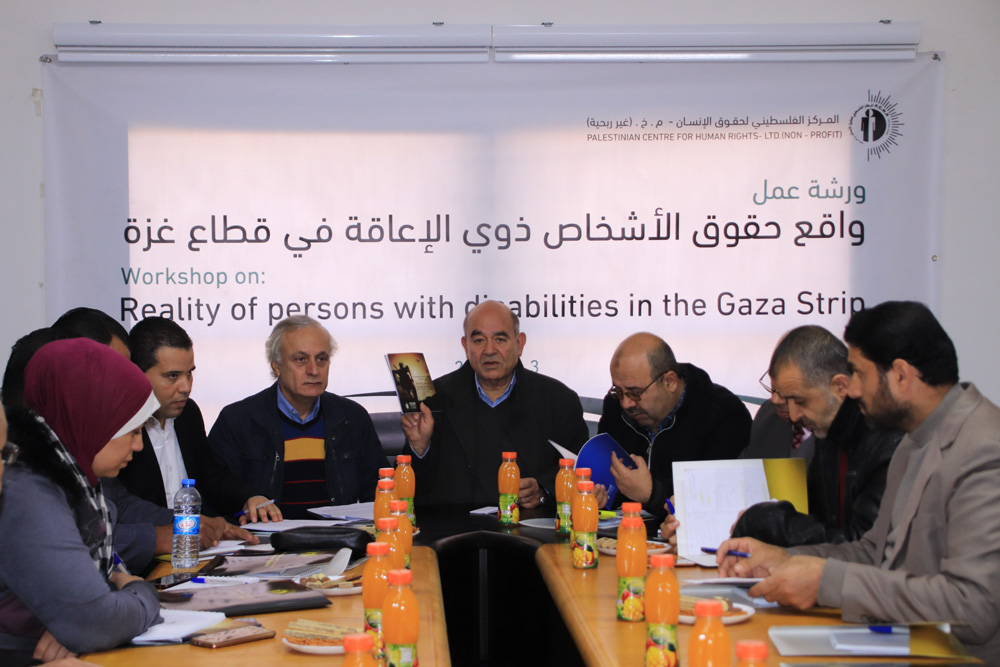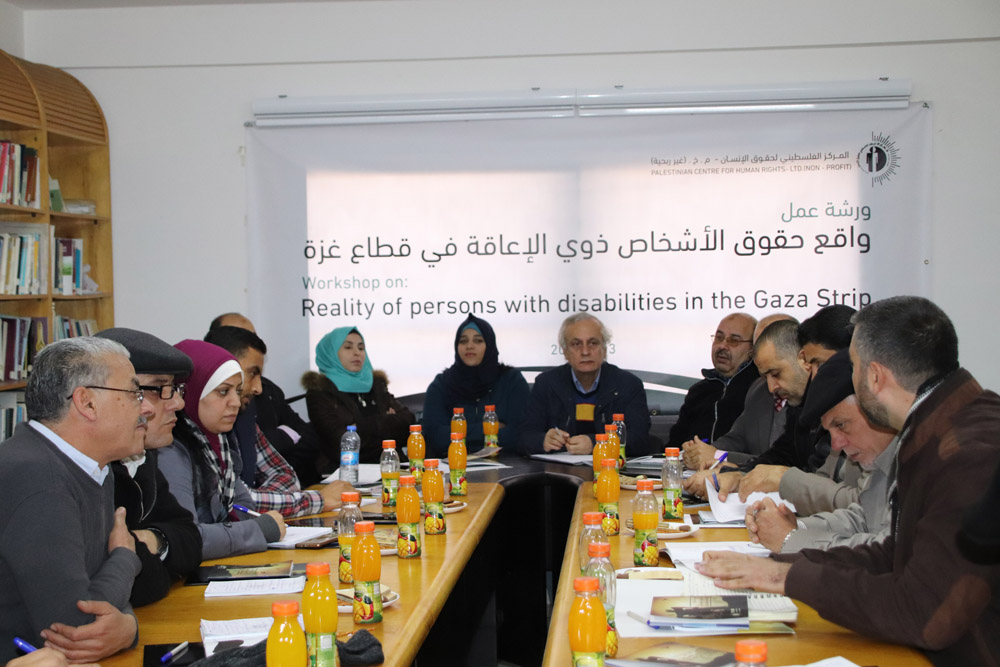
 On Thursday, 03 January 2019, PCHR held a workshop titled as “Rights of Persons with Disabilities in the Gaza Strip” in its head office in Gaza City. The workshop was attended by Specialists representing Government Ministries, rehabilitation centers, civil society organizations and media participated in this workshop, which was facilitated by Khalil Shahin, Director of PCHR’s Economic, Social and Cultural Rights Unit.
On Thursday, 03 January 2019, PCHR held a workshop titled as “Rights of Persons with Disabilities in the Gaza Strip” in its head office in Gaza City. The workshop was attended by Specialists representing Government Ministries, rehabilitation centers, civil society organizations and media participated in this workshop, which was facilitated by Khalil Shahin, Director of PCHR’s Economic, Social and Cultural Rights Unit.
Raji Sourani, PCHR’s Director, opened the workshop by reflecting PCHR’s part in supporting the rights of persons with disabilities in the occupied Palestinian Territory (oPt) through monitoring and documenting the violations against them on both the Palestinian and the Israeli agendas,. He also reviewed PCHR’s position on laws and formulation of policies that protect their rights and meet their social and economic needs 20 years after issuing the Palestinian Disability Law that has not been applied due to the current Palestinian division.
 Dr. Azzam Sha’at, a researcher in the Economic, Social and Cultural Rights Unit, reviewed a report prepared by PCHR on the “Reality of Rights of Persons with Disabilities in the Gaza Strip.” He highlighted the report’s parts: general information on the persons with disabilities in the Gaza Strip, legal frameworks that regulate the rights of persons with disabilities, legal obligations and the role of Palestinian institutions in realizing the rights of persons with disabilities in social affairs, health, education, rehabilitation and employment. Dr. Sha’at added that the report’s content depends on interviews conducted with representatives of official competent government bodies, rehabilitation centers, persons with disabilities and their families.
Dr. Azzam Sha’at, a researcher in the Economic, Social and Cultural Rights Unit, reviewed a report prepared by PCHR on the “Reality of Rights of Persons with Disabilities in the Gaza Strip.” He highlighted the report’s parts: general information on the persons with disabilities in the Gaza Strip, legal frameworks that regulate the rights of persons with disabilities, legal obligations and the role of Palestinian institutions in realizing the rights of persons with disabilities in social affairs, health, education, rehabilitation and employment. Dr. Sha’at added that the report’s content depends on interviews conducted with representatives of official competent government bodies, rehabilitation centers, persons with disabilities and their families.
Dr. Ahmed al-Hawajry, General Director of Educational Counseling in the Ministry of Education, reviewed the level of services which the Ministry of Education provides for the students with disabilities, including education, educational rehabilitation, and psychosocial support. He added that the Ministry supports 2879 female and male students with disabilities and has hired 10 teachers to take care of 10 students and stay with them permanently in addition to establishing resource centers and rooms and hiring experts of special education to take care of the students with disabilities. Dr. al-Hawajry elaborated that the Ministry of Education opened a secondary school, which is the first of its kind for deaf-mute students in Palestine. He added that four promotions graduated from this school and the school curriculum has been tailored to fit these students. In addition, he noted that the Higher Education institutions opened many specializations for the care and education of the deaf-mute students.
Ghassan Felfel, Director of Persons with Disabilities Department in the Ministry of Social Development, indicated that the services of the General Administration of Persons with Disabilities in the Ministry of Social Development are concentrated in the West Bank while they are very limited in the Gaza Strip and do not meet the needs of persons with disabilities in the Gaza Strip due to the non-allocation of an independent financial budget. This results in the shortage of services in social affairs, care, rehabilitation and other fields. He added that since the Palestinian Division in 2007, the services that persons with disabilities receive have decreased because of the lack of communication and coordination between the two ministries in the West Bank and the Gaza Strip. Moreover, even after the Palestinian Reconciliation agreement in October 2017, the connection between the West Bank and the Gaza Strip is still limited without any profit for the people with disabilities, who struggle in light of the economic pressures and aggravation of the Gaza Strip crises due to the continuous closure on the Gaza Strip.
 Samy ‘Aweimer, Head of Physiotherapy and Rehabilitation Department in the Ministry of Health, affirmed that Ministry of Health provides the service within its capabilities which do not meet the needs of persons with disabilities. He elaborated that Physiotherapy Departments receive patients from the clinics and patient rooms at the hospitals. He added that due to the shortage of the Ministry’s capabilities to establish medical rehabilitation governmental hospitals, a special medical committee under the supervision of the Physiotherapy Department in the Health Ministry provides medical rehabilitation services for the persons with disabilities in the Gaza Strip through contracting to buy the rehabilitation treatment service, and then the Ministry refers the cases in need for the rehabilitation services.
Samy ‘Aweimer, Head of Physiotherapy and Rehabilitation Department in the Ministry of Health, affirmed that Ministry of Health provides the service within its capabilities which do not meet the needs of persons with disabilities. He elaborated that Physiotherapy Departments receive patients from the clinics and patient rooms at the hospitals. He added that due to the shortage of the Ministry’s capabilities to establish medical rehabilitation governmental hospitals, a special medical committee under the supervision of the Physiotherapy Department in the Health Ministry provides medical rehabilitation services for the persons with disabilities in the Gaza Strip through contracting to buy the rehabilitation treatment service, and then the Ministry refers the cases in need for the rehabilitation services.
In his intervention, Mustafa ‘Aabed, Director of the Medical Rehabilitation Program at the Medical Relief Society(PMRS), said there are some governmental services available for persons with disabilities, but they are not at the required level and do not meet the needs of persons with disabilities in the Gaza Strip and their families. He added that the basic services were affected by the political division and its repercussions on the economic and social situation in the Gaza Strip. ‘Abed emphasized that since 2007 the services have been replaced by in-kind assistance and others within the Social Protection Program that does not meet the urgent needs of persons with disabilities. Consequently, the government’s role falls short of providing basic services to them, violating all international and Palestinian laws, especially after the State of Palestine has acceded to the 2006 Convention on the Rights of Persons with Disabilities.
The workshop was concluded with interventions by the participants, and recommended to: